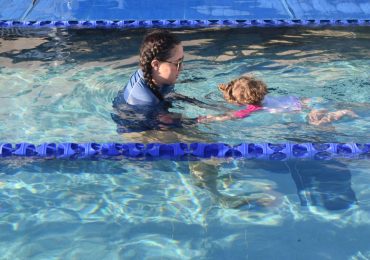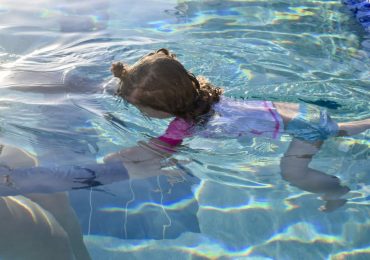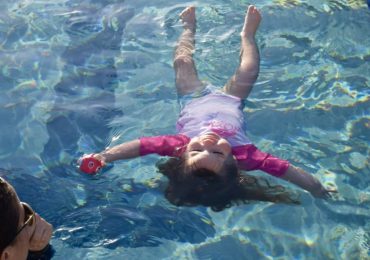These are frequently asked questions for new water lilies just like you. If you should have any questions that we haven’t covered here, please feel free to contact us!
Water Lilies is a safe, effective, and certified learn-to-swim program that begins lessons as early as 6 months, or when a baby can sit up and crawl. Research shows that early swimmers meet developmental milestones earlier than their non-swimming peers. We prepare your child to be both an aquatic problem solver and a competent swimmer.
Our instructors continually refine their skills through ongoing training to provide the best possible instruction. Water Lilies lessons incorporate Infant Self Rescue (ISR) skills with PediaSwim techniques. We combine drowning prevention lessons with fundamental stroke development to ensure comprehensive aquatic education.
Repetition and consistency are crucial for young children’s learning. Research shows that short, frequent lessons lead to higher retention.
Children typically have short attention spans and struggle to focus for long periods. At Water Lilies, we aim to take advantage of their optimal learning times.
Even though we maintain the pool temperature, it is still lower than your child’s body temperature. Swimming lessons are hard work, causing your child to lose body heat, which can lead to temperature fatigue—a sign of physical fatigue. When children get tired, they tend to reject additional information if the lesson continues too long. Keeping the class period shorter helps maintain their interest and enjoyment in swimming.
Children often fuss when introduced to new environments, people, and tasks. As your child gains confidence in the water, fussing will decrease. Initially, lessons may be challenging until they get the hang of it.
Patience is key, and all instructors at Water Lilies are masters of patience. Your instructor will work to make your child comfortable, but the necessary skills will be taught regardless of any crying. Remember, crying is a form of communication and a sign of life. If a child can cry, they can breathe.
If your child cries, it doesn’t necessarily mean they aren’t ready for swimming lessons. They might be adjusting to separation from Mom or Dad, getting used to the new surroundings, or just having a bad day. Give your child some time to develop their confidence. Soon, they’ll be able to enjoy this wonderful experience.
We invite parents to observe a lesson before enrolling. Your role is to be a cheerleader—your child will feel more comfortable seeing you seated, smiling, clapping, and offering encouragement. Watching the safety skills in action can sometimes be challenging, but being prepared will help you better support your child. If your child is more focused on your presence and gets distracted, you may be asked to watch from out of sight.
Parents are invited into the pool during the fourth week of Basic Training, once the instructor feels your child is ready to practice their new skills with you, if you wish.
Parents do not get in the water during our lessons. However, we do encourage you to sit pool side to watch and cheer your child on.
Parents are invited into the pool during the final week of lessons which will be arranged with your instructor. You will be shown the proper techniques you can practice at home, to maintain your child’s new skills.
Sandys Location: 9 Long Bay Lane, Sandys. Beige house on the right directly after Somerset Primary and Lagoon Park Preschool if driving towards Daniel’s Head. Please park on the grass out front and walk up to the pool in the back. Video Directions
Southampton Location: 13 Rebecca Road, Southampton. (Blue house) Parking is the next left after the house down a grass path where you will find the pool and pool house. Please take care as this is a oneway and there are some bumps. On rainy days, you may park at the top to avoid challenges driving back up.
Tucker’s Point: Lessons available to Beach club members which are hosted at the main hotel and/or the beach club.
We hold swimming lessons rain or shine, but if there are forecasted thunderstorms directly over the island or if the rain is extreme, lessons will be canceled. Your instructor will discuss rescheduling options for a makeup lesson. If rescheduling is not possible, a credit will be given.
Statistics show that 86% of children who fall into water do so fully clothed. To prepare our students for such an emergency, we want them to experience the sensation of being in the water with their clothes on. This practice can help reduce panic and improve their ability to focus on reaching safety.
Normal clothing is very absorbent, making it heavier and more challenging to navigate through the water. By practicing in such conditions, students learn to persevere through difficult situations. Safety is our number one concern, and this training provides an additional layer of protection for your child in case of a water emergency.
Fear and apprehension in the water are distinct experiences. Fear is a learned behavior that arises from discomfort and a dislike for something, and it can be persistent if not addressed. Apprehension, on the other hand, is a natural response to new or unfamiliar environments, like water.
During the first few lessons, your instructor will take the time to understand your child’s unique personality, including their likes and dislikes regarding water activities. For instance, some children enjoy being underwater but dislike floating on their backs, while others may not like getting water in their ears or on their faces. Over time, as your child becomes accustomed to the lessons and realizes they involve hard work, they may show reluctance, such as crying when getting out of the car. This reaction is often due to apprehension rather than fear.
If the lessons were purely about playing on the steps, children might eagerly run to the pool. However, we strive to balance work and play to help them adapt. For example, children may initially dislike water on their faces, but with continuous exposure, they will learn to tolerate and adapt to it.
As a parent, you ensure your child engages in activities essential for their safety because you understand their importance. If your child has developed a fear due to a past emergency situation, please inform the instructor. They will adopt a slightly different approach to rebuild your child’s confidence while still encouraging them to progress. Although the instructor may push your child more than you would as a parent, this approach ultimately aims to benefit your child in the long run.
All lessons require a proper swimsuit. Please ensure your child brings a swimsuit, towel, and goggles if they are in stroke development lessons. Swimmers under the age of three or those not fully potty-trained must wear a properly fitted swim diaper under their swimsuit. Reusable swim diapers are preferred because they fit more snugly, reducing the risk of accidents in the pool. A swimsuit or a pair of shorts should be worn over the diaper. Even a small accident can close the pool for up to 24 hours.
Your child cannot swim in a regular diaper, as it expands and can release gel into the pool. The instructor will check at the beginning of each lesson to ensure your child is wearing a swim diaper. If you are uncertain, please do not take the chance.
We understand that life happens! If you need to cancel a lesson, please provide 24 hours’ notice. Lessons canceled with less than 24 hours’ notice will be charged against the current lesson program purchased. In case of an emergency cancellation, a makeup lesson may be offered if the schedule allows. If a swimmer is more than 10 minutes late to their scheduled lesson, the lesson will be canceled, and the client will be charged. For rescheduling options, please use the iClassPro app or the Customer Portal, address them directly with your instructor, or send us an email.




